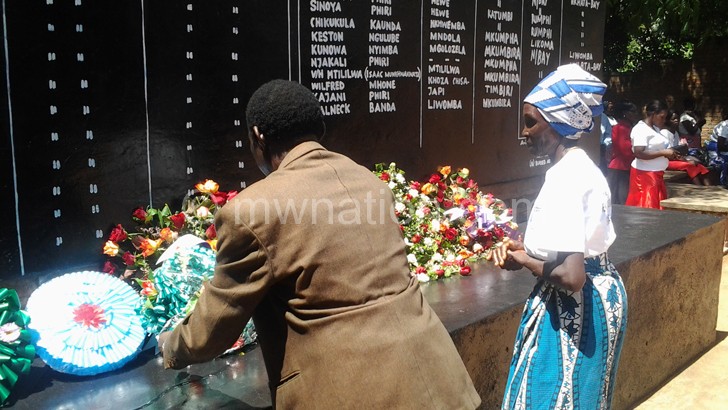Lawsuit against UK faces hurdles
A plan spearheaded by lawyer-cum-lawmaker Ralph Mhone to launch a legal suit against the British government over the March 3 1959 massacre is facing ‘serious’ hurdles.
Mhone disclosed in an interview on Tuesday that the British lawyer, Chris Esdaile, who successfully represented 5 000 Kenyans against Britain for the torture and abuse suffered during the Mau Mau uprising in 1950s, came into the country last May over the matter.

Esdaile offered to help families of the victims to pursue justice by launching a legal battle in London, just as he did with the Kenyan case where the British government compensated Kenyans with 20 million pounds (about K17.1 billion at the current exchange rate).
In Malawi, at least 61 people were killed after the declaration of State of Emergency by the British government, and Mhone expected some assistance from government if the victims or their relatives were to pursue justice.
But what came out clearly from the discussion between Esdaile and Mhone is that the matter requires extensive research as Mhone claims there is hardly a researched paper on the 1959 massacre.
He said the matter also requires cooperation from the Malawi Government, which he said might be in possession of ‘some sensitive communication’ made between the British government and their men on the ground in Malawi.
But the Malawi Government, through Ministry of Foreign Affairs and Attorney General’s office (AG), has refused to get involved in the matter.
Foreign Affairs Minister George Chaponda in an interview on Tuesday said government had nothing to do with that case, arguing that in the Kenyan scenario government was never involved.
Chaponda said: “That issue has not come to my attention, but even if I had to come across it, government’s position is that we have nothing to do with this matter.”
Mhone, whose Nkhata Bay District lost 31 people at the hands of the Rhodesia Army and South African Police Service, when the State of Emergency was declared, said measures taken after his conversation with the British lawyer in May included writing to the AG Kalekeni Kaphale seeking help access the purported secret communication made between the British government and their men on the ground in Malawi.
In an interview on Thursday, Kaphale acknowledged receipt of Mhone’s letter, but said he was surprised that Mhone did not know the right door to knock, yet he advised him to approach the National Archives.
“I’m surprised you’re telling me he is still expecting a response from my office,” said Kaphale.
But Mhone said he wrote the AG’s office and there was no response yet. He also disclosed that Senior Chief Mkumbira had also written the British High Commission, through Malawi’s Ministry of Foreign Affairs, seeking compensation and, again, there has not been any response.
Professor of social history at the University of Malawi’s Chancellor College Wiseman Chijere Chirwa said documentation on the matter is readily available at National Archives.
Chijere Chirwa said soon after the incident, there was a commission of inquiry set up, which came up with a report critical of the British government. He said the commission’s report is also available in London at Public Records Office.
Chijere Chirwa said: “Legally, those interested to pursue the matter may wish to challenge the legality of the Riots Act, which the British used to carry out that operation, because it was a valid law that time.”
On its part, the British High Commission in response to a questionnaire on Wednesday said the High Commission had nothing more to say on the matter, beyond what it already said.
Head of Political and Public Affairs at the British High Commission, Hellen Chabunya, said the British government [put it on record that it] is saddened by any loss of life [during the 1959 killings].
Chabunya said: “We have had no discussions with the Government of Malawi on this matter and do not consider that the issue of compensation arises.”
But Mhone, who said was determined to pursue the legal suit and expected well-wishers to come in as the exercise is costly, said only compensation to the relatives of the victims who were gunned down or put in detention would help to close the dark human right chapter unleashed by the British government.
The Nkhata Bay Central legislator said when they asked for extra-sensitive information from Association of Commonwealth Archives and Record Managers, which the British Government shipped to London from Malawi at a time Malawi was gaining independence, they were told that the available information can be provided at the expense of those looking for it.
Mhone said: “The Foreign and Commonwealth Office in London, Ministry of Defence in London and University of Cambridge have some information, but this research will require enough money.”
He said while it is on record that the Britain’s House of Commons sanctioned the State of Emergency, which was a political decision, it would be difficult to establish what happened at operational level.





